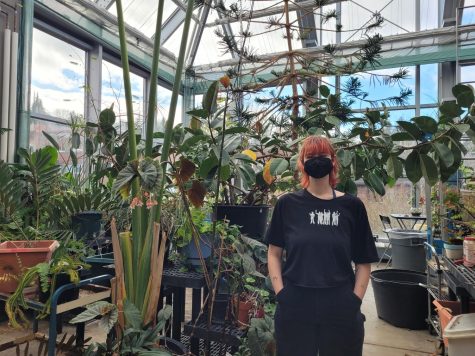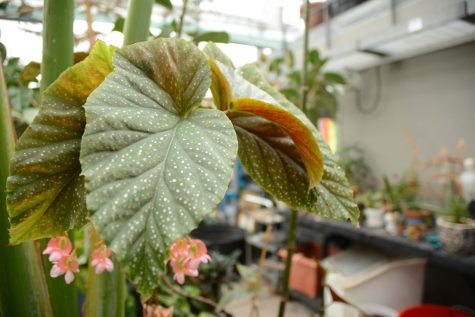Potted thoughts
Lessons growing from ground of greenhouse
February 24, 2022

The campus greenhouse is an enigma, all hearsay. Like the Adamic paradise of Eden, students find Seattle Pacific University’s own “Garden of Eaton” inaccessible. But there is nothing fantastical about it. Simply, the greenhouse is closed to visitors.
COVID-19 put a damper on life. Student visitation is limited because of the pandemic, making indoor gatherings difficult and uncertain.
Dr. Derek Wood, professor of biology, oversees the SPU greenhouse. He hopes to restore general student access as soon as possible. Still, variants such as omicron keep the plans stale.
“We usually have open hours where people can come by. It’s just closed down because of COVID. But now that we’re open and back up, I think that it’s going to start again,” said Wood.
The greenhouse is a beautiful space. Filled with natural light, it is home to over 200 varieties of plants. Cactuses, hibiscuses, an avocado tree, ZZ plants, ferns, coffee, chocolate, lily pads and succulents form dense indoor foliage. At the center, the thorned trunk of a Norfolk Pine spindles up into the air.
The greenhouse is fully automated, and its system adjusts the temperature, humidity and light density for optimal conditions. Inside, it is warm and muggy, best suited for a t-shirt and jeans. Although tech-savvy and self-sufficient, the greenhouse still requires a human element.
“The greenhouse always has a manager, and that’s a student manager,” said Wood. “All the pest control, all the watering, all the cleaning and organization, all the cataloging of plants, [managing] either a Facebook page or Instagram page, setting up the plant sale—that’s what the greenhouse manager does.”
It is up to Ava Liebendorfer, a second-year ecology major.
“It’s pretty chaotic,” said Liebendorfer. “It’s constantly an adventure. I’m dealing with a lot of living things that all have their very specific requirements, and they can’t necessarily speak and tell me what’s going on.”
It is an effort. Watering is catered. Tropical fronds drink from saturated pots, while succulents only need a spritz or two. Pests are also of concern. Liebendorfer picks them by hand or scrubs them away with a solution, an all-natural method, no pesticides.
Liebendorfer recognizes the relationship between person and plant. It is intimate.
“The plants definitely have attitudes. We got some sassy ones. I had to move a bunch of plants the other day because they were all getting really upset. It’s like working in a really dramatic work environment, except your coworkers don’t talk. They just die,” said Liebendorfer.
But these sassy creatures serve important purposes for SPU’s students and faculty. The greenhouse is used by many classes. Biology students conduct research, propagating specimens for desired phenotypes or decomposing deer heads by means of flesh-eating beetles. Classes on plant taxonomy teach students to identify species. Even art students visit the greenhouse to illustrate plant structures.
Liebendorfer and Wood are working hard to bring these experiences back to students. They believe the opportunity to work within the greenhouse will provide students with a certain peace of mind.
“People really want something to care for right now, and it’s a reminder of the natural world and our impact on it,” said Liebendorfer. “It definitely gives me a sense of purpose. Days that I really don’t want to get out of bed, still gotta water the plants.”
And plants need people too.

“It makes me sound like a hippie, but you gotta talk to them,” said Liebendorfer. “I think they got lonely over the past two years.”
The social-emotional deprivation of plants reflects the global environment. Climate change is real. Emissions, waste and consumption have altered the Earth. Its effects have spilled immeasurably.
“There [are] so many more natural disasters, weather patterns have been changing and it’s really heartbreaking to feel so helpless,” said Liebendorfer. “This space, even though I’m trying to keep it as healthy of an environment as possible, [is] not the real world.”
Artificial snow is pumped atop the Beijing mountains, creating a visible change. For many, these ‘fake’ ecosystems beg the question: What can one do? Begin with experience. To be in nature is to build consciousness. While the greenhouse remains closed until further notice, there is still a world to inhabit.
“Environmentally, I think one of the things we like to do in our family is we go out and we plant trees, and we also do habitat regeneration,” said Wood.
Advocacy and policy will also determine the environment’s future.
“One of the most important things we can do, we’re all eighteen, is vote. I’d love to encourage students to really research upcoming elections and see exactly which laws are being passed and if they would affect conservation,” said Liebendorfer.
There will be a plant shop opening during Spring Quarter. Organized by Liebendorfer, it will fundraise for both charitable organizations and the greenhouse. Last year’s event donated all profits to The Trevor Project, a suicide prevention effort for the LGBTQIA+ community. As a ten-year tradition, the plant sale will take place next quarter to raise funds for an organization of Liebendorfer’s choosing.
The greenhouse is a sanctuary for life. It shares resources for its organisms and reveals knowledge for study. While time on Earth is short, it is time, nonetheless, unceasing. Consider that. Consider plants. Push forward.
“They’re slow. They’re gonna grow however they want. They know exactly what they need and they’re not gonna take anything more,” said Liebendorfer. “They’re a natural part of the world we can bring into our homes, our schools, and society as a reminder of who we are and where we come from.”
To stay informed on plant sales and greenhouse hours, follow the Garden of Eaton’s Instagram page @spugreenhouse.

























































































